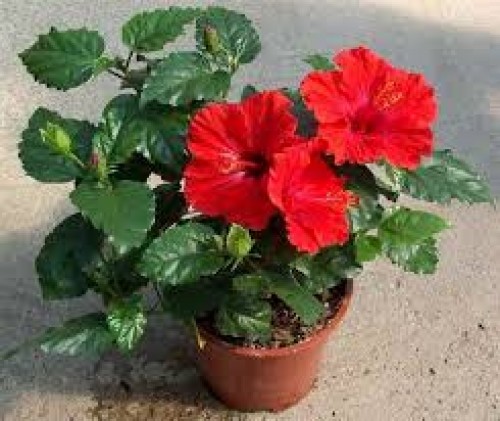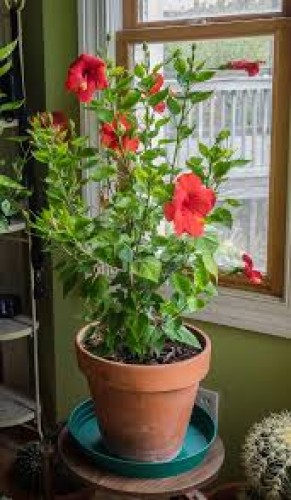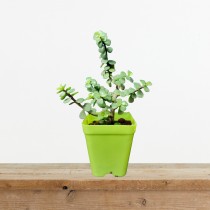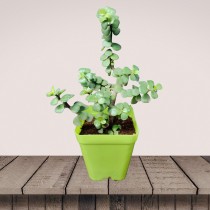off
-
Sold
-

-

out
Hibiscus Plant: Nature, Care & Advantages
The **Hibiscus plant** (*Hibiscus rosa-sinensis*), known for its vibrant and showy flowers, is one of the most popular ornamental plants grown worldwide. It is native to tropical regions and has become a symbol of beauty, elegance, and grace. Hibiscus plants come in various colors, including red, yellow, pink, and white, and are often used for landscaping, as well as in traditional medicine. Additionally, the plant is known for its therapeutic properties, making it a valuable addition to home gardens.
Nature of the Hibiscus Plant
The Hibiscus plant is a flowering shrub that can grow up to 3-6 feet tall, depending on the variety. It produces large, trumpet-shaped flowers that bloom in vibrant hues, adding a touch of elegance to any garden. The plant's glossy green leaves provide an attractive backdrop for its colorful flowers. Hibiscus plants are often used in tropical landscaping due to their striking appearance and ability to thrive in warm climates. They prefer full sun, but some varieties can tolerate partial shade.
Care for the Hibiscus Plant
- Climate: Hibiscus plants thrive in tropical and subtropical climates. They prefer warm temperatures between 20°C and 30°C. Frost can damage the plant, so it is essential to protect it from cold weather or bring it indoors in cooler climates.
- Soil: Hibiscus plants prefer well-drained, slightly acidic to neutral soil. Rich, loamy soil with good organic matter content is ideal for healthy growth. Ensure the soil is loose and not compacted to allow proper root development.
- Watering: Hibiscus requires regular watering, especially during the growing season. The soil should remain moist but not waterlogged. Water the plant deeply, and allow the top layer of the soil to dry out before watering again. In winter, reduce watering to avoid root rot.
- Sunlight: Hibiscus plants need full sunlight to bloom well. They should receive at least 6 hours of direct sunlight each day to promote healthy growth and vibrant flowers. If grown indoors, place them near a sunny window.
- Fertilizing: Hibiscus plants benefit from regular feeding. Use a balanced fertilizer or one that is high in potassium and phosphorus to encourage abundant flowering. Fertilize once a month during the growing season (spring through early fall), and reduce fertilization in winter.
- Pruning: Regular pruning helps to maintain the shape and size of the plant. Trim any dead or damaged branches, and remove spent flowers to encourage new growth. Pruning after the flowering season promotes healthy new growth and better blooms for the following year.
- Propagation: Hibiscus plants can be propagated through cuttings or seeds. For cuttings, take a healthy stem, remove the lower leaves, and place it in a pot with moist, well-drained soil. Rooting hormones can help speed up the rooting process. Seeds can be sown in warm, moist soil but may take longer to germinate.
Advantages of the Hibiscus Plant
- Ornamental Value: The Hibiscus plant is widely valued for its vibrant and striking flowers. It is commonly used in landscaping, as hedges, or in decorative pots to enhance the beauty of gardens, homes, and public spaces. Its colorful blooms make it an attractive addition to any outdoor or indoor setting.
- Medicinal Benefits: Hibiscus has been used in traditional medicine for centuries. Hibiscus tea, made from the plant's flowers, is believed to help lower blood pressure, improve heart health, and support the immune system. It is also known for its anti-inflammatory and antioxidant properties.
- Promotes Skin Health: The antioxidants found in hibiscus, such as vitamin C, help protect the skin from free radical damage. Hibiscus extract is commonly used in skincare products to maintain healthy, youthful-looking skin. It is believed to prevent premature aging, reduce the appearance of wrinkles, and improve skin elasticity.
- Supports Hair Growth: Hibiscus has long been used in hair care for its ability to promote hair growth and prevent hair loss. Hibiscus oil and hibiscus-infused hair masks help nourish the scalp, improve blood circulation, and strengthen hair follicles, leading to healthier and thicker hair.
- Digestive Health: Hibiscus has mild diuretic properties that help promote healthy digestion and urinary function. It can aid in relieving constipation and bloating. Additionally, hibiscus is known to support liver health by promoting detoxification and the removal of toxins from the body.
- Weight Loss: Drinking hibiscus tea may aid in weight loss by helping to reduce body fat and improve metabolism. Some studies suggest that hibiscus extract can reduce the accumulation of fat in the liver and support weight management efforts when consumed as part of a healthy diet.
- Anti-cancer Properties: Hibiscus is rich in antioxidants, which can help prevent oxidative damage and reduce the risk of cancer. Studies have shown that hibiscus extract may help inhibit the growth of cancer cells and prevent the spread of tumors, though more research is needed to confirm these benefits.
Conclusion
The **Hibiscus plant** is a beautiful and versatile plant that not only adds aesthetic value to gardens but also offers a wide range of health benefits. Its striking flowers and medicinal properties make it a popular choice for both ornamental and therapeutic purposes. With proper care, hibiscus can thrive in your garden, providing vibrant blooms and numerous health advantages for years to come. Whether you are growing it for its beauty or health benefits, the Hibiscus plant is a valuable addition to any home or garden.

